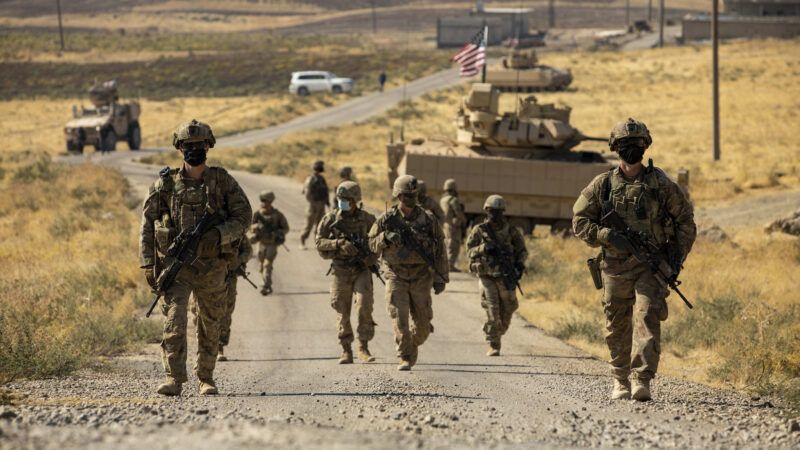House Votes To Repeal 1957 and 1991 Authorizations for the Use of Military Force
Repeal would do little to change how Congress and the president collaborate—or don't—on military operations.

On Tuesday, the House voted to repeal two war authorizations, the 1957 Authorization for the Use of Military Force (AUMF) and the 1991 AUMF, which grant the president broad discretion in military operations in the Middle East absent congressional approval. The measure passed 366–46 as part of a larger bill package.
AUMFs allow the president to use military force against certain hostile parties without an official declaration of war, for which the Constitution grants Congress sole authority. Though Congress has not formally declared war since World War II, the U.S. has engaged in conflicts far and wide thanks to ever-broadening interpretations of AUMFs and other war legislation.
The 1957 AUMF was signed into law by President Dwight D. Eisenhower and authorized him to counter possible communist hostility in the Middle East. The measure had a provision allowing the president to "use armed forces to assist any such nation…requesting assistance against armed aggression from any country controlled by international communism." Critics have pointed out that the language of the 1957 AUMF did not simply authorize force, but "declared a policy to use it."
The 1957 AUMF has never been invoked by a presidential administration to justify military activity. Rep. Peter Meijer (R–Mich.), who sponsored the 1957 AUMF repeal bill, noted that rolling back the measure would have no impact on ongoing military conduct.
The other measure subject to yesterday's House vote, the 1991 AUMF, was the primary authorization through which the U.S. entered the Gulf War. It hasn't been invoked since that conflict, but as sponsor Rep. Abigail Spanberger (D–Va.) explained, "The fact that it hasn't been misused or hasn't been abused doesn't mean that that possibility doesn't exist at some point in the future."
On June 17, the House voted to repeal the 2002 AUMF, which granted the president the authority to combat Saddam Hussein's regime in Iraq without congressional approval. The vote margin for that bill was tighter than Tuesday's at 268–161, even though its repeal would not affect current U.S. military conduct either. It hasn't been used as the sole authorization behind operations since the Iraq War ended in 2011.
Meanwhile, the 2001 AUMF that authorized the president to invade Afghanistan—and which has been the basis of 41 operations in 19 countries—has not seen a formidable legislative challenge.
The measures Congress has repealed won't lead to a meaningful reduction in presidential overreach in military conduct. Indeed, these bills passed the House in part because their repeal wouldn't affect contemporary military campaigns. The White House backs repealing the 2002 AUMF because it would "likely have minimal impact on current military operations." Repealing benign laws, even those with concerning underpinnings, would do little to change how Congress and the president collaborate—or don't—on military operations.
What's especially telling is that President Joe Biden hasn't invoked a single AUMF—not the one from 1957, 1991, 2001, or 2002—to justify the airstrikes he's carried out in his 161 days in office. To authorize his February airstrikes in Syria and his Sunday attacks there and in Iraq, he cited Article II of the Constitution, which allows the president to protect U.S. service members in self-defense. (Whether the strikes were truly defensive is still open to debate.)
That dynamic highlights an important aspect of presidential war making—an executive determined to wage war has tools at his disposal, even without the broad discretion granted to him by AUMFs. As symbolically important as it is to repeal the legislation that took away much of Congress' combat oversight, more will need to be done to tie the president's hands.
Show Comments (18)